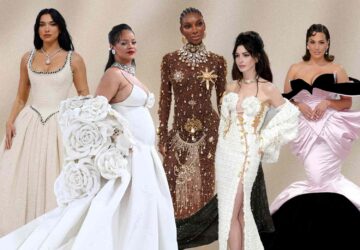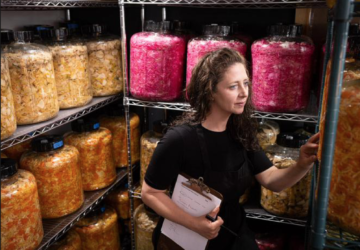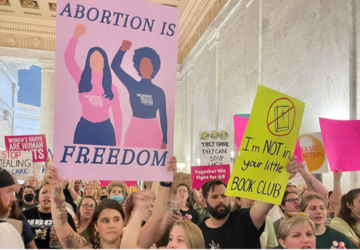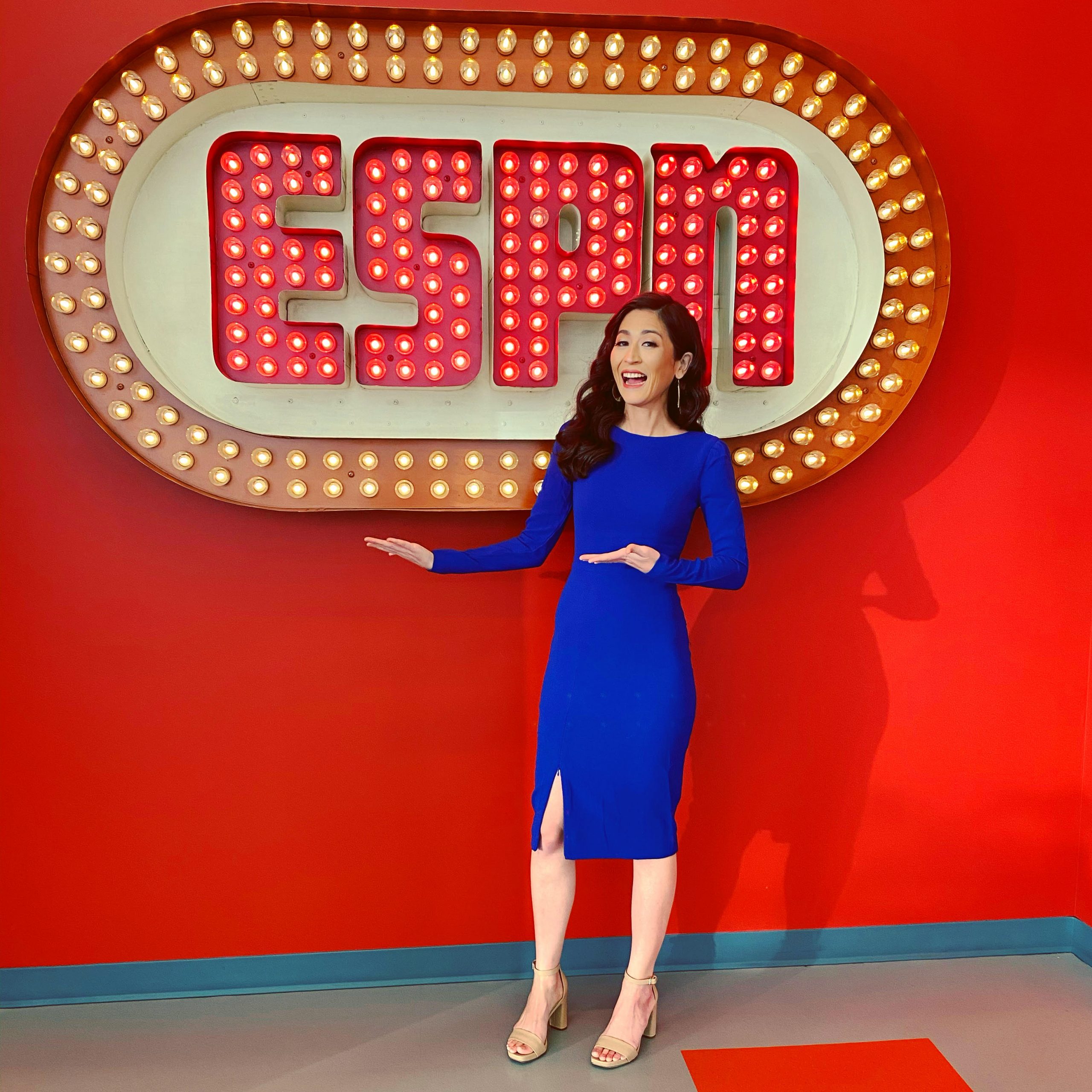Mina Kimes is an award-winning journalist, senior writer and NFL analyst for ESPN. Since joining ESPN in 2014, her profile has grown across the company’s multimedia platforms, spanning digital and print, television, radio and podcasting.
In June 2020, Kimes was named an NFL analyst, joining ESPN’s daily news and information show, NFL Live. She also provides football analysis on Get Up, SportsCenter, First Take and more, in addition to being a regular contributor to Around the Horn and Debatable, ESPN’s daily digital show. Kimes has been at the forefront of ESPN’s podcasting efforts. She hosts The Mina Kimes Show featuring Lenny football podcast and launched the ESPN Daily podcast in October 2019. The original host of ESPN Daily, Kimes remains a contributor in the NFL offseason.
Prior to ESPN, Kimes was an investigative reporter for Bloomberg News (2013) and a business writer for Fortune Magazine (2007-13), where she penned pieces on topics from arms exports to tainted drugs. A two-time finalist for the Dan Jenkins Medal for Excellence in Sportswriting, Kimes received a National Headliner Award first place honor in 2019 for magazine feature writing. Kimes has also earned numerous awards for business and investigative journalism. She was the inaugural recipient of the SABEW’s (Society of American Business Editors and Writers) Larry Birger Young Business Journalist prize, honoring journalists under age 30. Other organizations that have recognized her work include the New York Press Club, the National Press Club, and the Asian American Journalists Association (AAJA).
Kimes graduated summa cum laude from Yale University with a bachelor of arts in English.
Interview Transcript:
Cameron Song: Your career progression has been amazing and feels like a series of bigger leaps to more difficult challenges. How were you able to make the transition from being a business writer to casually writing about sports and then being considered an expert in football?
Mina Kimes: Thank you for calling it that. For me, I’ve made a bunch of transitions in my career as you’ve alluded to, going from writing about business to writing about sports and then from writing to opinionating and each time I really tried to find the common thread between what I was already doing and what I was beginning. Going from covering business to covering sports, it’s a totally different field and obviously I had to learn a lot about not only the subject matter but the process of covering athletes versus covering businesses and doing investigative stories. Fundamentally I also knew the tools were the same in terms of reporting, gathering information, talking to people, coming up with ideas. When I went from writing to being an analyst it was similar, again a very big leap in terms of the day to day of doing my job. But in some ways there are still similarities, when I was a reporter my job was gathering and synthesizing and communicating information and being an analyst is really the same thing. I always try to figure out “what I already know about how to do this” so that I didn’t feel like I was starting from zero each time.
Cameron: I read that when you were preparing for college that your dad prepared a 50 point plan and the two of you had strategy sessions. Seems like the plan worked! Do you approach your work and career with the same type of detail and discipline your dad taught you?
Mina: Yeah, I am a big time over-preparer. When I was a writer I used to spend just as much time outlining my stories as I did writing them to be honest. As an analyst I spend certainly far more time doing prep than I actually do on TV or doing podcasts. I would say for me that is where I get my confidence from. Being on TV and giving your opinions and putting yourself out there for a living is scary no matter who you are, certainly if you’re not a former athlete in my space. I always found it was a little less scary if I was over prepared so that’s something I always leaned on.
Cameron: Can you talk a little about your process? Do you take the same approach in sports as you did in business writing or investigative journalism?
Mina: When I was a writer I actually did take a pretty similar approach. I was a features writer at ESPN and before that I was a features writer at Bloomberg and Fortune. My process was pretty similar – I would start by reading everything I could about whoever I was writing about or whatever I was writing about, so I would start with a research process. From there I would work on coming up with questions and angles and then after doing the interviews and reporting and research I would really try to look at all of the information I had gathered and all the research I had done and work on building a story from there. My process as an analyst is very different just because I am no longer writing. It’s a lot of obviously watching football, watching tape throughout the week, gathering statistics and trying to marry what I am finding in the numbers and what I see on tape to come up with opinions and thinking about effective ways to communicate that.
Cameron: That’s great. How is preparing for a podcast different from writing articles and how is being on TV different from a podcast?
Mina: I would say podcasts are unique in so far as it’s a lot looser. So really what you’re doing is trying to gather information and then structure a conversation. For my podcast, which is a football show, a lot of my preparation is taking notes while watching, gathering stats and then thinking what are the games and questions I would like to cover and loosely working from there. I am not reading from anything, I am not pre-determining what I am going to talk about, it’s more just general gathering information and having it in front of me before I sit down to talk.
Cameron: Seems like ESPN used to have two types of people on football, either the ex coaches or former players to talk strategy and plays and the stats and analytics people who talk numbers. What’s special about you is that you can do both. How did you not get pigeonholed into just one area?
Mina: You know I was really lucky to find people who believed in me. I found people who were thinking outside the box and recognized that you didn’t have to be a former player to be interesting and entertaining on TV. I guess a lot is always made of my identity which is kind of unusual for my job, and the reality is there are just very few people – forget women or Asian Americans – doing what I do. I think for ESPN it was a matter of several different producers being accepting of the idea and then ultimately my colleagues who I am on TV with also being accepting of the idea and boosting me every step of the way.
Cameron: When you decided to be on TV, were you trained – how did you learn?
Mina: Well I started on a show called Around the Horn, I was also doing Highly Questionable at the same time. Like a lot of reporters who were making the transition into TV, Around the Horn was the first TV I did on ESPN. That show is unique in that it is very structured. Everyone is asked a question and you are only really given about 40 seconds to a minute to talk. It’s a little bit easier of an entry point, but in some ways it’s actually harder to be good at. When you are making the transition to TV it’s a good place to start because you learn how to be concise, synthesize information, and give opinions in a way that works on TV.
Cameron: Your colleagues, especially the ex-pro players seem to really respect your football expertise. How did you build that credibility to have so many players get upset when Jeff Garcia tweeted what he said about you not having played the game?
Mina: You know for me it’s really just the day-to-day of working with these guys. We talk every day about what we see, what we are thinking. Obviously we have so many conversations while we’re on TV, but we have so many conversations behind the scenes. I think through those conversations there is a lot of mutual trust and respect built, as well as just friendships. I think a big part of the reason why the guys I work with have been supportive is that they are my friends. They would say they would do it even if they weren’t my friend but I do think our friendships are the foundation of not only that support publicly but also what makes for good TV.
Cameron: I really appreciate the fact that you shout out the Korean community whenever you can. Between Younghoe Koo, Kyler Murray and Kyle Hamilton, you are definitely the president of the Korean NFL Association. When did you feel comfortable enough to push for this on air?
Mina: I guess I’ve always been comfortable and proud of my Korean identity. Before I started ESPN I already had a tattoo of the Korean flag on my shoulder. That’s something I’ve always been keen on, learning more about and embracing my identity. I think for me just seeing Korean Americans, especially our viewers and listeners respond to it, has motivated me to be more public than ever about it. I hear from Koreans a lot and Asian Americans really, not just Koreans, that it makes them happy to feel represented on TV. Also it makes them think that doing the job I do is even a possibility so with that in mind it feels important to me to embrace that and display my pride in it.
Cameron: Based on how successful you transitioned from business writing to sports, do you want to broaden your career beyond sports media?
Mina: To be honest at the moment I really love covering sports and I have so much to learn especially as it pertains to football which is so complicated and intricate. What I love the most about my job is that sense of learning and understanding and increased mastery so I feel I have a lot of room for growth in sports before I leave it.
Cameron: Would you ever want to run a team?
Mina: (Laughs) I don’t think so. That job seems a lot more stressful than my job.
Cameron: Since this is a series on the 50th anniversary of Title IX, I need to ask what’s the one area you wish we made more progress under Title IX?
Mina: Title IX obviously goes beyond sports and has ramifications for sexual misconduct and assault on campus. I feel like that’s still a pervasive issue in colleges and one that colleges are still failing to get their arms around in terms of dealing with cases like that. That’s probably number one for me in terms of where we have to go as a society. As far as women’s sports goes I think again, compliance, the existence of Title IX is a huge factor behind the growth of women’s sports in this country which is fantastic. But when you actually look at colleges, you see that compliance is still lacking. In some ways many schools still don’t live up to the intent of the law. This goes beyond Title IX but I would say with women’s sports generally I think the media has to do a better job of covering them because whenever we ask how do we grow audience and viewership it really starts with coverage which we’ve seen with all sports, but certainly women’s sports.
Cameron: As a woman who covers football, do you ever feel pressure to cover women’s sports?
Mina: I would say not pressure but I would say internally I wish that I had the bandwidth to cover more as someone who says it deserves more coverage. We do talk a lot about women’s sports on Around the Horn and some of the shows I do regularly. It’s something I am really proud of. For me, it’s unusual for me to cover football as a woman and I feel it’s something important for me to do right now.
Cameron: So, you were the Phone-a-Friend lifeline for David Chang in his record breaking run on Who Wants to Be a Millionaire. What an honor to be his choice and then for him to trust you! If you were on, who would be your phone-a-friend?
Mina: Ooh that is a good question, I would probably say Bomani Jones. He’s a guy I work with who knows everything.
Cameron: Finally, what’s one piece of advice you would give someone looking to go into the media business?
Mina: I think right now especially with social media there’s always a lot of focus on personal branding and social media but, really especially when you’re young, expertise is the most important thing you can develop. That’s not something that’s necessarily done in public, but it’s reading and watching as much as possible in whatever subject you’re interested in covering, whether it’s a sport, a team, the news, culture, whatever – just consuming especially early on more than putting things out there is really important.







